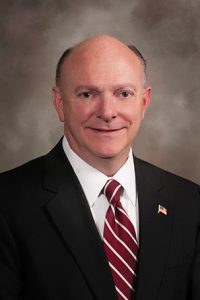Tax credit for private school scholarship donations proposed

The Revenue Committee heard testimony Jan. 26 on a bill that would allow private donations to fund scholarships for students who attend private schools in Nebraska.
LB295, introduced by Papillion Sen. Jim Smith, would create a nonrefundable tax credit for those who donate money to nonprofit organizations that grant scholarships to students to attend a private elementary or secondary school in Nebraska.
Individuals, pass-through entities, estates, trusts and corporations would receive a nonrefundable income tax deduction equal to the contributions they make. Credits could be carried forward for up to five years.
Smith said the bill is meant to ensure that all families, especially ones with low incomes, have the opportunity to send their children to private schools if they so choose.
“Some children thrive in one environment while others do better in another,” he said. “Unfortunately not all families have the means to make that choice for themselves.”
Only students from a household with an income less than twice the required level of the federal reduced-price lunch program would be eligible to receive scholarships. They must also be receiving an education scholarship for the first time and transferring from a public school or entering kindergarten or the ninth grade.
The bill would limit the total amount of credits to $10 million for the 2018 calendar year and would allow 25 percent increases each year after that if most of the credits are claimed.
The state Department of Revenue would certify scholarship-granting organizations, which would be required to offer one or more scholarships to eligible students and grant scholarships without limiting them to only one qualified school.
Jim Vokal, CEO of the Platte Institute, testified in support of the bill. By boosting the number of private school students, he said, the bill ultimately would save the state money because public school enrollment would drop. Vokal said an analysis of a similar Florida program found that the state saved $1.49 for every dollar it spent on tax credits.
“But the [bill] deserves your support not because it saves money over time but also because it’s the right thing to do for working families in Nebraska,” he said.
Patrick Slattery, superintendent of the Archdiocese of Omaha, said enrollment in the archdiocese’s 70 schools increased by 700 in the last two years, and the majority of those students meet free and reduced-price lunch requirements. He said the bill is not about favoring private schools over public schools but about giving more families the opportunity to choose the best education for their children.
“In my opinion,” he said, “there are thousands of families that, if they had additional access to scholarship dollars, would have an option — would have that ability — to choose.”
Jayleesha Cooper, an eighth grader who attends an Omaha Catholic school, also testified in support of the bill, saying that she would have benefited from a tax credit scholarship. Cooper’s mother worked two jobs to help pay for tuition, and she eventually received financial assistance. Cooper said the bill would increase the number of scholarships available to students like her who wish to attend private school.
“There are many kids just like me who want to find a school that is a better fit for them,” Cooper said, “but they aren’t able to go to the private school options because they don’t have enough funds.”
John Bonaiuto, executive director of the Nebraska Association of School Boards, opposed the bill, saying that the amount of credits could grow dramatically with the proposed annual increases, reducing state tax revenue.
“We’re not saying it’s the public schools’ money,” he said, “but it’s money that you’re not going to have when you sit down to make decisions for the state.”
Kathy Danek, a Lincoln Public Schools board member, also testified in opposition to the bill. She said Nebraska has a high-quality public school system that already provides parents with a choice of schools through its option enrollment system. She said the bill would divert tax revenue that could be used to pay for public schools.
“Can Nebraska afford to pay for two systems of education?” she said. “The Constitution requires one, a public system where every child who walks through our door is served.”
Renee Fry, executive director of OpenSky Policy Institute, also opposed the bill. She said LB295 would not save the state money, as proponents say, because even if public enrollment declines, schools’ fixed costs, such as lighting, heating and maintenance, will not change. Claims that the bill is aimed at helping low-income families are misleading, she said, because children could qualify for scholarships even if their family’s income is in the top 40 percent in the state.
“Many middle- and upper-class families would receive a tax break for sending kids to private school when they would have gone to private school anyway,” she said.
The committee took no immediate action on the bill.


